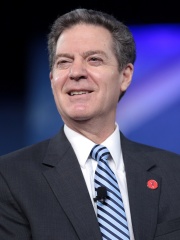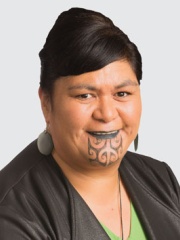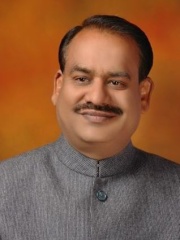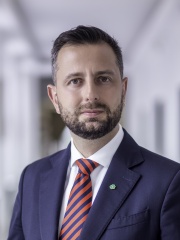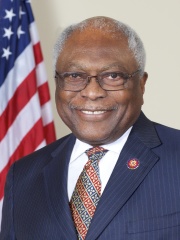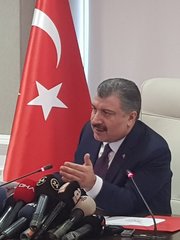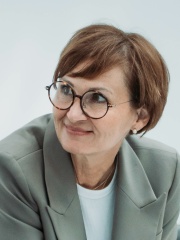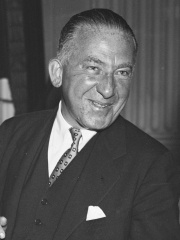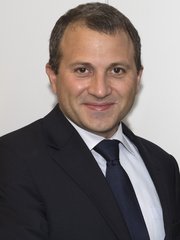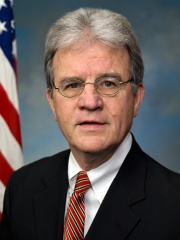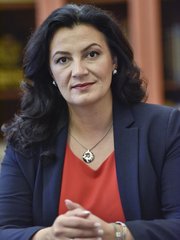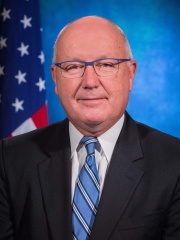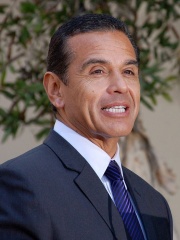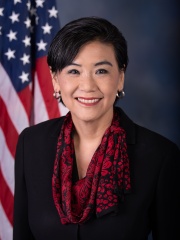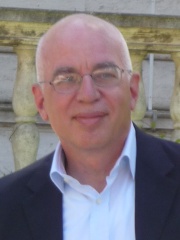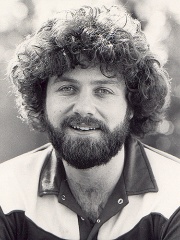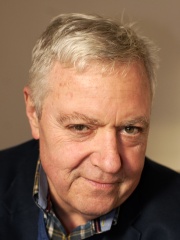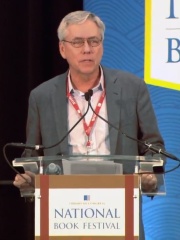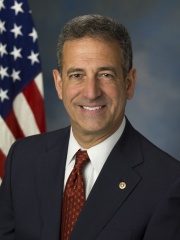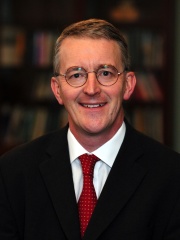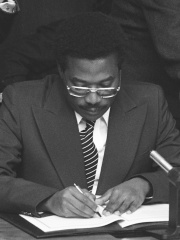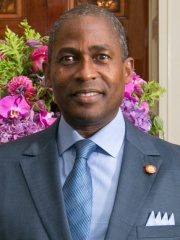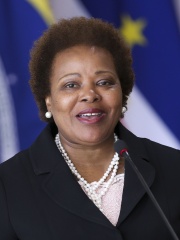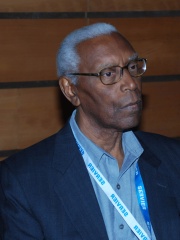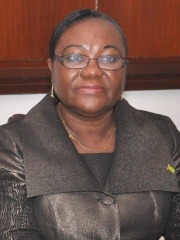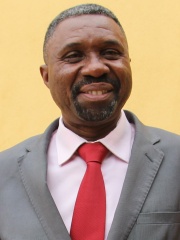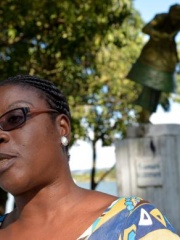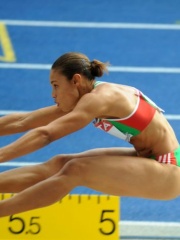Politician
Joaquim Rafael Branco
1953 - today
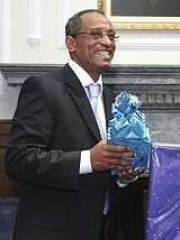
 Joaquim Rafael Branco
Joaquim Rafael Branco
Joaquim Rafael Branco (born 7 September 1953) is a São Toméan politician who was the 16th prime Minister of São Tomé and Príncipe from 2008 to 2010. He is the President of the Movement for the Liberation of São Tomé and Príncipe/Social Democratic Party (MLSTP/PSD). Read more on Wikipedia
His biography is available in 15 different languages on Wikipedia. Joaquim Rafael Branco is the 18,641st most popular politician (down from 17,437th in 2024), the 14th most popular biography from São Tomé and Príncipe (down from 12th in 2019) and the 12th most popular São Toméan Politician.
Memorability Metrics
Page views of Joaquim Rafael Branco by language
Among Politicians
Among politicians, Joaquim Rafael Branco ranks 18,641 out of 19,576. Before him are Sam Brownback, Nanaia Mahuta, Om Birla, Władysław Kosiniak-Kamysz, Jim Clyburn, and Fahrettin Koca. After him are Bettina Stark-Watzinger, Ernest Gruening, Gebran Bassil, Tom Coburn, Ivanna Klympush-Tsintsadze, and Pete Hoekstra.
Most Popular Politicians in Wikipedia
Go to all RankingsSam Brownback
1956 - Present
HPI: 46.05
Rank: 18,642
Nanaia Mahuta
1970 - Present
HPI: 46.05
Rank: 18,643
Om Birla
1962 - Present
HPI: 46.04
Rank: 18,644
Władysław Kosiniak-Kamysz
1981 - Present
HPI: 46.04
Rank: 18,645
Jim Clyburn
1940 - Present
HPI: 46.04
Rank: 18,646
Fahrettin Koca
1965 - Present
HPI: 46.04
Rank: 18,647
Joaquim Rafael Branco
1953 - Present
HPI: 46.03
Rank: 18,648
Bettina Stark-Watzinger
1968 - Present
HPI: 46.03
Rank: 18,649
Ernest Gruening
1887 - 1974
HPI: 46.03
Rank: 18,650
Gebran Bassil
1970 - Present
HPI: 46.02
Rank: 18,651
Tom Coburn
1948 - 2020
HPI: 46.02
Rank: 18,652
Ivanna Klympush-Tsintsadze
1972 - Present
HPI: 46.01
Rank: 18,653
Pete Hoekstra
1953 - Present
HPI: 46.01
Rank: 18,654
Contemporaries
Among people born in 1953, Joaquim Rafael Branco ranks 671. Before him are Antonio Villaraigosa, Judy Chu, Michael Wolff, Keith Green, Diane Schuur, and John Sessions. After him are Carl Hiaasen, Pete Hoekstra, Russ Feingold, Charlie Wilson, Hilary Benn, and Brian Duffy.
Others Born in 1953
Go to all RankingsAntonio Villaraigosa
POLITICIAN
1953 - Present
HPI: 46.38
Rank: 665
Judy Chu
POLITICIAN
1953 - Present
HPI: 46.35
Rank: 666
Michael Wolff
JOURNALIST
1953 - Present
HPI: 46.29
Rank: 667
Keith Green
MUSICIAN
1953 - 1982
HPI: 46.26
Rank: 668
Diane Schuur
SINGER
1953 - Present
HPI: 46.15
Rank: 669
John Sessions
ACTOR
1953 - 2020
HPI: 46.08
Rank: 670
Joaquim Rafael Branco
POLITICIAN
1953 - Present
HPI: 46.03
Rank: 671
Carl Hiaasen
WRITER
1953 - Present
HPI: 46.02
Rank: 672
Pete Hoekstra
POLITICIAN
1953 - Present
HPI: 46.01
Rank: 673
Russ Feingold
POLITICIAN
1953 - Present
HPI: 46.00
Rank: 674
Charlie Wilson
SINGER
1953 - Present
HPI: 45.97
Rank: 675
Hilary Benn
POLITICIAN
1953 - Present
HPI: 45.94
Rank: 676
Brian Duffy
ASTRONAUT
1953 - Present
HPI: 45.80
Rank: 677
In São Tomé and Príncipe
Among people born in São Tomé and Príncipe, Joaquim Rafael Branco ranks 14 out of 17. Before him are Leonel Mário d'Alva (1935), Gabriel Costa (1954), Maria do Carmo Silveira (1961), Carlos Graça (1931), Maria das Neves (1958), and Jorge Bom Jesus (1962). After him are Gedson Fernandes (1999), Conceição Lima (1961), Jorge Fonseca (1992), Fernando Pereira (1963), Naide Gomes (1979), and Laura Traets (1998).
Others born in São Tomé and Príncipe
Go to all RankingsLeonel Mário d'Alva
POLITICIAN
1935 - Present
HPI: 53.74
Rank: 8
Gabriel Costa
POLITICIAN
1954 - Present
HPI: 53.40
Rank: 9
Maria do Carmo Silveira
POLITICIAN
1961 - Present
HPI: 53.15
Rank: 10
Carlos Graça
POLITICIAN
1931 - 2013
HPI: 53.12
Rank: 11
Maria das Neves
POLITICIAN
1958 - Present
HPI: 51.88
Rank: 12
Jorge Bom Jesus
POLITICIAN
1962 - Present
HPI: 49.84
Rank: 13
Joaquim Rafael Branco
POLITICIAN
1953 - Present
HPI: 46.03
Rank: 14
Gedson Fernandes
SOCCER PLAYER
1999 - Present
HPI: 44.58
Rank: 15
Conceição Lima
WRITER
1961 - Present
HPI: 43.88
Rank: 16
Jorge Fonseca
WRESTLER
1992 - Present
HPI: 42.14
Rank: 17
Fernando Pereira
MILITARY PERSONNEL
1963 - Present
HPI: 41.25
Rank: 18
Naide Gomes
ATHLETE
1979 - Present
HPI: 38.04
Rank: 19
Laura Traets
ATHLETE
1998 - Present
HPI: 28.97
Rank: 20
Among Politicians In São Tomé and Príncipe
Among politicians born in São Tomé and Príncipe, Joaquim Rafael Branco ranks 12. Before him are Leonel Mário d'Alva (1935), Gabriel Costa (1954), Maria do Carmo Silveira (1961), Carlos Graça (1931), Maria das Neves (1958), and Jorge Bom Jesus (1962).
Leonel Mário d'Alva
1935 - Present
HPI: 53.74
Rank: 6
Gabriel Costa
1954 - Present
HPI: 53.40
Rank: 7
Maria do Carmo Silveira
1961 - Present
HPI: 53.15
Rank: 8
Carlos Graça
1931 - 2013
HPI: 53.12
Rank: 9
Maria das Neves
1958 - Present
HPI: 51.88
Rank: 10
Jorge Bom Jesus
1962 - Present
HPI: 49.84
Rank: 11
Joaquim Rafael Branco
1953 - Present
HPI: 46.03
Rank: 12
